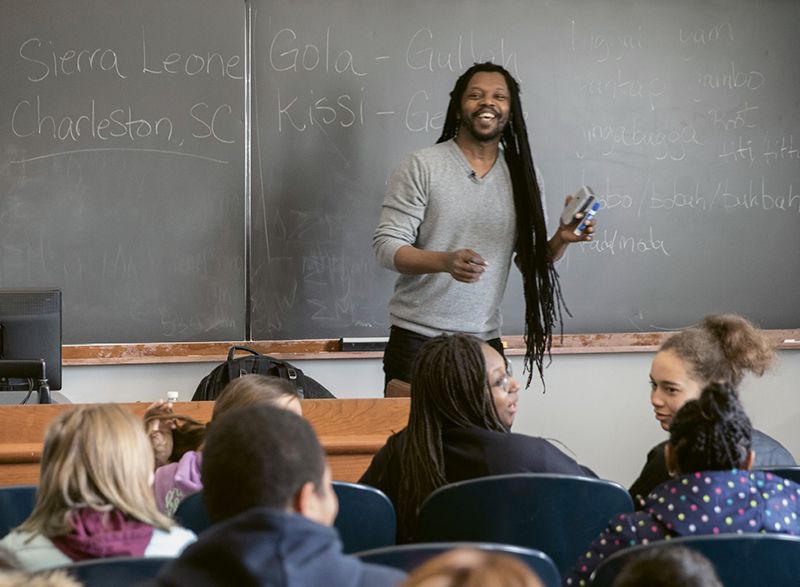Mount Holly native Sunn m’Cheaux is back in school, teaching the Gullah language at Harvard

Sunn m’Cheaux instructs seventh graders in Harvard University’s Project Teach program with Cambridge Public Schools.
Walking across the Yard, as Harvard’s main campus is called, can feel like wandering the corridors of the United Nations. With an internationally diverse student body amid the cosmopolitan environs of Boston/Cambridge, the din of foreign languages there is par and parlance for the course. But Lowcountry visitors to this ivy enclave would be wise to listen up—you might hear something familiar.
This fall marks the second year that Gullah is being offered in Harvard’s African Language Program. The first-ever collegiate course in Gullah, it’s right there in the catalogue, after Amharic and Bemba, before Haitian Creole and Igbo, and among more than 30 other African language classes. Students can take Gullah to fulfill the university’s foreign language requirement, as a credit toward an African studies major, or simply because they’re drawn to the unrelenting charisma of Harvard’s inaugural Gullah instructor, Charleston native Sunn m’Cheaux.

While visiting the Goose Creek land that’s been in his family since the 1860s, m’Cheaux performs one of the Gullah-inspired songs he’s written.
M’Cheaux, an artist, musician, performer, activist, and occasional rad skateboarder (check out his Instagram!), had “for years been using various platforms to teach the Gullah language and culture as a preservation effort,” he notes. But in 2016, a grad student sparked a serendipitous connection that led to his role at Harvard. He’s thrilled to be there as an ambassador for his native language and culture—and that’s quite a change from his own academic experiences growing up in Mount Holly, just north of Goose Creek.
“We spoke Gullah at home, but it was washed out of us at school,” he says. “Most of us who grew up Gullah were stigmatized. We were taught to never speak it outside of the house, so we became adept at code switching.” That sense of embarrassment was often a class issue, not just a racial one, he shared on a recent Charleston Activist Network podcast.
There’s no embarrassment anymore, as m’Cheaux proudly rattles off Gullah phrases to a roomful of curious, semi-bewildered seventh graders as part of Harvard’s Project Teach. The outreach program seeks to broaden local middle schoolers’ horizons and college aspirations—something that m’Cheaux, whose oldest sister was the first college graduate in his family, takes seriously. “I hope the fact that I’m here teaching at Harvard might empower others, be a testament to what we are capable of,” says m’Cheaux, who uses his platform to celebrate the “collective creativity” of the Gullah community, from the music of his friends Ranky Tanky to basket weavers, artists, and chefs.
“I hope I can give someone else the confidence to say, ‘We out chea, we doing this, we be making moves, doing our thing.’ We’re here, affirming our presence and our value,” says m’Cheaux, who shares his personal experiences on social media. “If I can contribute to creating a better climate around Gullah Geechie people, then I’m happy.”
Photograph by (classroom) Kris Snibbe/Harvard University